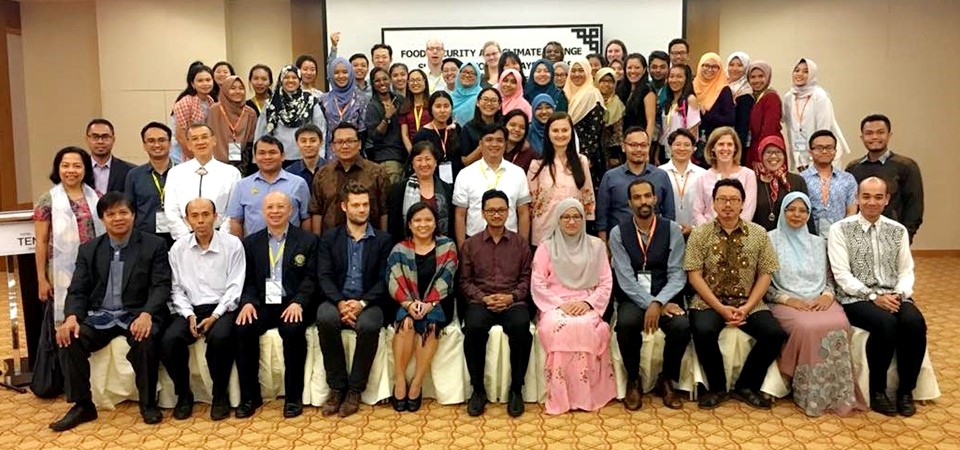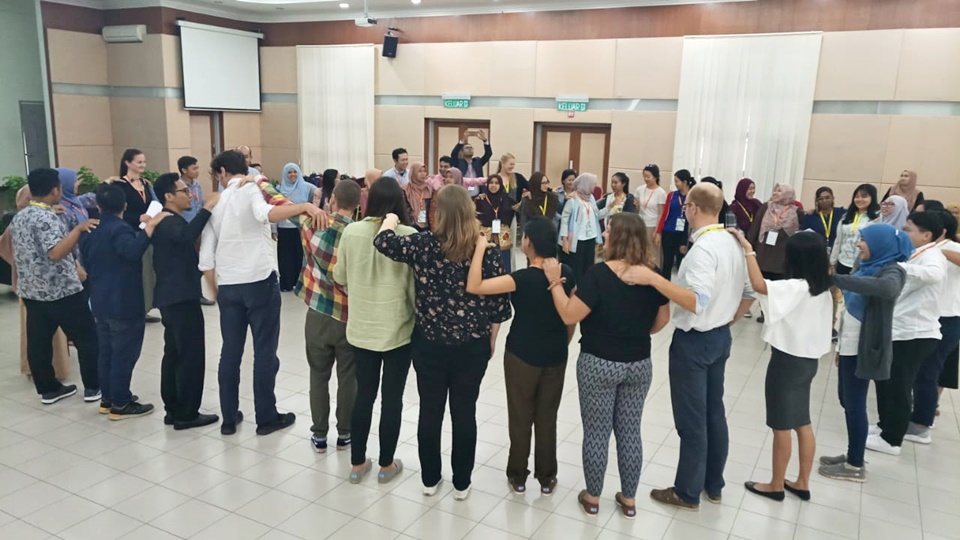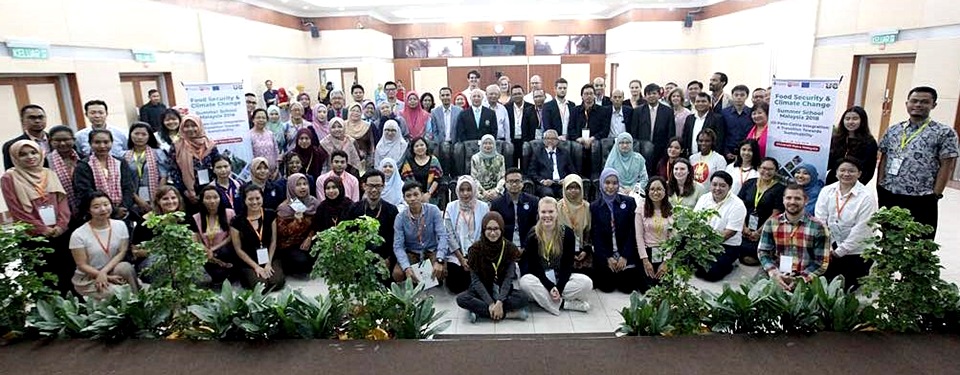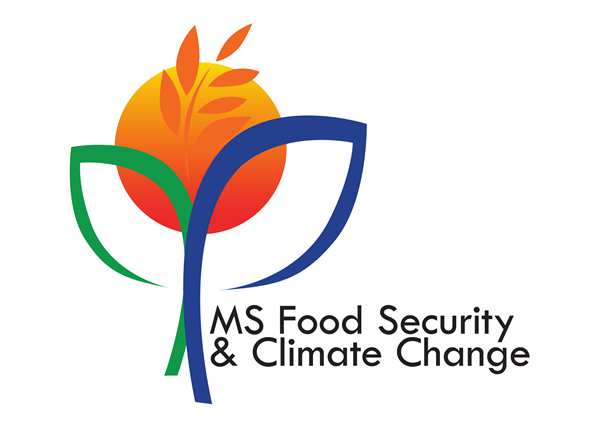- Details
- Category: 2018
 Southeast Asian Regional Center for Graduate Study and Research in Agriculture (SEARCA) members consisted of Bogor Agricultural University (IPB) and Gadjah Mada University from Indonesia, Universiti Putra Malaysia from Malaysia, Kasetsart University from Thailand, University of Los Banos from Philippines with European universities consortium whose members are IAVF-AGREENIUM and Agrinatura,collaborated to develop a food security and climate changerelated master program curriculum on August 7th-11th, 2018. The invited speakers present at the occasion were as followed: Dean of IPB Graduate School—Prof. Dr. Anas Miftah Fauzi, Secretary of IPB Graduate School (Master Program)—Prof. Dr. Nahrowi, Dr. Poon Kasemsap (Thailand), Dr. Nuttakan Nitayapat (Thailand), Dr. Antje Henkelmann (Germany) and Dr. Didier Pilot (Agrinatura). The curriculum was prepared in the "Workshop Master of Science in Food Security and Climate Change (MS FSCC) SEARCA" package.Vice Rector of Education and Student Affairs of IPB—Dr. Drajat Martianto in his opening remarks emphasized the importance of this joint curriculum concerning climate change challenge that are associated with food insecurity and production, flooding, drought, logistics, disrupted food distribution, crop damage, destruction food availability, food consumption, food shortages and eventually nutritional problems. Anticipations that must be prepared included policies and human resources acknowledged with technical matters about predictions and studies thus play role in early warning actions system. Currently twinning programme in this regard has not existed in IPB itself therefore credit recognitions for specific related courses must be arranged for this aim.
Southeast Asian Regional Center for Graduate Study and Research in Agriculture (SEARCA) members consisted of Bogor Agricultural University (IPB) and Gadjah Mada University from Indonesia, Universiti Putra Malaysia from Malaysia, Kasetsart University from Thailand, University of Los Banos from Philippines with European universities consortium whose members are IAVF-AGREENIUM and Agrinatura,collaborated to develop a food security and climate changerelated master program curriculum on August 7th-11th, 2018. The invited speakers present at the occasion were as followed: Dean of IPB Graduate School—Prof. Dr. Anas Miftah Fauzi, Secretary of IPB Graduate School (Master Program)—Prof. Dr. Nahrowi, Dr. Poon Kasemsap (Thailand), Dr. Nuttakan Nitayapat (Thailand), Dr. Antje Henkelmann (Germany) and Dr. Didier Pilot (Agrinatura). The curriculum was prepared in the "Workshop Master of Science in Food Security and Climate Change (MS FSCC) SEARCA" package.Vice Rector of Education and Student Affairs of IPB—Dr. Drajat Martianto in his opening remarks emphasized the importance of this joint curriculum concerning climate change challenge that are associated with food insecurity and production, flooding, drought, logistics, disrupted food distribution, crop damage, destruction food availability, food consumption, food shortages and eventually nutritional problems. Anticipations that must be prepared included policies and human resources acknowledged with technical matters about predictions and studies thus play role in early warning actions system. Currently twinning programme in this regard has not existed in IPB itself therefore credit recognitions for specific related courses must be arranged for this aim.
- Details
- Category: 2018

SERDANG, SELANGOR, Malaysia — The 2018 UC-FSCC Summer School was opened here this Monday, 16 July 2018, by Prof. Datin Paduka Dató Dr. Aini Ideris, Vice Chancellor of Universiti Putra Malaysia (UPM) and Malaysia's representative to the SEARCA Governing Board. Jointly organized by UPM, Universitas Gadjah Mada (UGM) in Indonesia and the University of Natural Resources and Life Sciences, Vienna (BOKU) in Austria, the Summer School is titled Oil Palm-Cattle Integration: A Transition Towards Sustainability in Food Security and Climate Change. The Summer School will run until 28 July 2018, while a Training of Trainers (ToT) is being held alongside the first week of the Summer School.
Dr. Maria Cristeta N. Cuaresma, SEARCA Program Head for Graduate Education and Institutional Development, welcomed the participants and resource persons of the Summer School and the ToT. She said that the Summer School has been a regular activity of the Southeast Asian University Consortium for Graduate Education in Agriculture and Natural Resources (UC) since 2015, with the UC members hosting the Summer School on rotation basis.
This year's Summer School has five sub-themes with different learning outcomes and activities. The sub-themes are on: Inter-Linkages of Food Security and Climate Change; Sustainability Transitions; Climate Change and Livestock: Impacts, Adaptation, and Mitigation; Integrated Livestock-Crop Systems in Mitigating Climate Change and Enhancing Food Security; and Oil Palm-Cattle Integration: Strategies to Achieve Synergy between Food Production and Environmental Quality towards Sustainability. The course is inter-disciplinary and multicultural, allowing students to work in diverse groups and collaborative ways. Lectures, field work, small group discussions, and student presentations are learning strategies being utilized in the program that allow for the academic content to be blended with immersive and experiential learning, thereby creating a unique opportunity for participants.
Forty-five students from 14 universities in 8 countries are participating in the Summer School. Among them are 25 students from the UC member universities, namely: 4 from Institut Pertanian Bogor, 5 from UGM, 9 from UPM, 1 from the University of the Philippines Los Baños, 3 from Kasetsart University, 2 from Tokyo University of Agriculture, and 1 from Universitas Brawijaya. The other participants from Southeast Asia come from Chiang Mai University (1), Prince of Songkla University (1), Royal University of Agriculture (4), University of Battambang (4), and Nilai University (1). The 9 European students in the Summer School include 8 from BOKU and 1 from Bern University of Applied Sciences.
On the other hand, there are two modules in the five-day ToT. Module 1 is on Sustainability Transition and Food Security while Module 2 is on Inverted Classrooms and Component-Based Grading Scheme. Participants to the ToT are staff from the MS FSCC partner universities. The MS FSCC is a project of the UC with funding from the European Commission's ERASMUS+ program that is being led by Kasetsart University and managed by SEARCA.


- Details
- Category: 2018

Thirty-four participants from overseas partner institutions joined 19 local participants in two back-to-back events hosted by SEARCA and the University of the Philippines Los Baños (UPLB) for the Master of Science in Food Security and Climate Change (MS FSCC) project on 19 – 24 March 2018.
The MS FSCC is a project initiated by the SEARCA-established Southeast Asian University Consortium for Graduate Education in Agriculture and Natural Resources (UC) and led by Kasetsart University (KU) in Thailand. It is partially supported by the ERASMUS + program of the European Union and counts 11 other partner institutions in Southeast Asia and Europe.
 The recently-concluded events in Los Baños consisted of a workshop to develop the joint curriculum for the MS FSCC and a Project Meeting to review the first-year implementation of the project. Part of the workshop outputs are detailed course analyses for the five MS FSCC program core courses and the required specialization courses for each of five training tracks. On the other hand, the review meeting looked at the project accomplishments in the past year, the challenges encountered, and the status of project implementation. As a result, some adjustments were made in the succeeding project activities and budget. This includes another workshop tentatively scheduled in July 2018 for the development of the course modules, teaching materials, and assessment tools for all required courses in the program to ensure the standardization of the course delivery across each of the UC members. Staff from the non-UC partners in the region including Prince of Songkhla University and Chiang Mai University, both in Thailand; Royal University of Agriculture and University of Battambang, both in Cambodia; Nilai University in Malaysia; and Central Luzon State University in the Philippines will also be asked to participate in the Summer Schools, so they can be trained to conduct similar events in their respective institutions.
The recently-concluded events in Los Baños consisted of a workshop to develop the joint curriculum for the MS FSCC and a Project Meeting to review the first-year implementation of the project. Part of the workshop outputs are detailed course analyses for the five MS FSCC program core courses and the required specialization courses for each of five training tracks. On the other hand, the review meeting looked at the project accomplishments in the past year, the challenges encountered, and the status of project implementation. As a result, some adjustments were made in the succeeding project activities and budget. This includes another workshop tentatively scheduled in July 2018 for the development of the course modules, teaching materials, and assessment tools for all required courses in the program to ensure the standardization of the course delivery across each of the UC members. Staff from the non-UC partners in the region including Prince of Songkhla University and Chiang Mai University, both in Thailand; Royal University of Agriculture and University of Battambang, both in Cambodia; Nilai University in Malaysia; and Central Luzon State University in the Philippines will also be asked to participate in the Summer Schools, so they can be trained to conduct similar events in their respective institutions.
The UC members include UPLB, KU, Universiti Putra Malaysia, Institut Pertanian Bogor, and Universitas Gadjah Mada. The European partner institutions in the MS FSCC are Montpellier SupAgro and Agreenium in France, Gottingen University in Germany, BOKU in Austria, and the consortium Agrinatura based in Czech Republic.

- Details
- Category: 2018

TOKYO, Japan – At a recent symposium held here, the Southeast Asian Regional Center for Graduate Study and Research in Agriculture (SEARCA) proposed to link two university consortia that share interests in agriculture and related sciences.
The Southeast Asian University Consortium for Graduate Education in Agriculture and Natural Resources (UC) launched by SEARCA in 1989 counts among its members nine leading agricultural universities in Indonesia, Malaysia, the Philippines Thailand, Japan, Canada, and Germany.
On the other hand, 68 universities in ASEAN, Japan, Korea are participating in the ASEAN International Mobility for Students (AIMS) Programme led by the Bangkok-based Southeast Asian Regional Center for Higher Education (RIHED). Four of the nine UC members are among the 68 universities in the AIMS Programme.
SEARCA and RIHED are two of the 24 centers of excellence and network of the Southeast Asian Ministers of Education Organization (SEAMEO).
At the Tokyo symposium on "Challenges for Campus to Campus, Establishment of Connectivity in Research and Education Beyond Borders" held on 12 February 2018, SEARCA presented the merits of opening the prestigious UC Graduate Forum to the AIMS universities to enable students to attend as well as present their research results.
Of the 10 major study fields that AIMS focuses on, agriculture, biodiversity, environmental management and science, food science and technology, marine science, and economics align with SEARCA's priority thrusts to promote inclusive and sustainable agricultural and rural development (ISARD).
"As such, SEARCA sees that drawing in AIMS scholars and researchers to the UC Graduate Forum can be an impetus for collaborations in new research among constituents of the UC and AIMS to boost agricultural and rural development," SEARCA Director Dr. Gil C. Saguiguit, Jr. said.
In addition to joining the UC Graduate Forum, Dr. Saguiguit noted that RIHED is also considering conducting Summer Schools and developing massive open online courses (MOOCs) for students who cannot go to other countries to do mobility.
Since the UC has been organizing Graduate Forums, Summer Schools and research collaborations and exchanges, Dr. Saguiguit said it would be seamless to tie up these activities to those of AIMS.
He added that Japan's Ministry of Education, Culture, Sports, Science and Technology (MEXT) and University of Tsukuba have expressed interest in supporting these collaborations by funding the participation not only of students, but also of university faculty and researchers. (Leah Lyn D. Domingo)
- Details
- Category: 2018
 Nine students under the Master of Science in Food Security and Climate Change (MS FSCC) program begin their enrolment in their host or second university this second semester 2017-2018. The member universities of the Southeast Asian University Consortium for Graduate Education in Agriculture and Natural Resources (UC), namely, Institut Pertanian Bogor and Universitas Gadjah Mada, both in Indonesia, Kasetsart University in Thailand, Universiti Putra Malaysia, and the University of the Philippines Los Baños serve as their study posts.
Nine students under the Master of Science in Food Security and Climate Change (MS FSCC) program begin their enrolment in their host or second university this second semester 2017-2018. The member universities of the Southeast Asian University Consortium for Graduate Education in Agriculture and Natural Resources (UC), namely, Institut Pertanian Bogor and Universitas Gadjah Mada, both in Indonesia, Kasetsart University in Thailand, Universiti Putra Malaysia, and the University of the Philippines Los Baños serve as their study posts.
Under the MS FSCC, students enroll under a particular program track involving two UC universities, are co-supervised by lecturers from these universities, and receive two degrees. They also have the opportunity to study in a partner European university for a semester, starting July 2018. The student mobilities are funded by the ERAMUS+ Capacity Building for Higher Education and are managed by SEARCA for Southeast Asia and by Agrinatura for the European mobility.
This first batch of FSCC students come from Cambodia, Indonesia, Malaysia, the Philippines, and Thailand. The call for applications for the second batch of MSFSCC students is open until 31 January 2018. For more details about MS FSCC, please refer to the website at www.msfscc.org.
 Southeast Asian Regional Center for Graduate Study and Research in Agriculture (SEARCA) members consisted of Bogor Agricultural University (IPB) and Gadjah Mada University from Indonesia, Universiti Putra Malaysia from Malaysia, Kasetsart University from Thailand, University of Los Banos from Philippines with European universities consortium whose members are IAVF-AGREENIUM and Agrinatura,collaborated to develop a food security and climate changerelated master program curriculum on August 7th-11th, 2018. The invited speakers present at the occasion were as followed: Dean of IPB Graduate School—Prof. Dr. Anas Miftah Fauzi, Secretary of IPB Graduate School (Master Program)—Prof. Dr. Nahrowi, Dr. Poon Kasemsap (Thailand), Dr. Nuttakan Nitayapat (Thailand), Dr. Antje Henkelmann (Germany) and Dr. Didier Pilot (Agrinatura). The curriculum was prepared in the "Workshop Master of Science in Food Security and Climate Change (MS FSCC) SEARCA" package.Vice Rector of Education and Student Affairs of IPB—Dr. Drajat Martianto in his opening remarks emphasized the importance of this joint curriculum concerning climate change challenge that are associated with food insecurity and production, flooding, drought, logistics, disrupted food distribution, crop damage, destruction food availability, food consumption, food shortages and eventually nutritional problems. Anticipations that must be prepared included policies and human resources acknowledged with technical matters about predictions and studies thus play role in early warning actions system. Currently twinning programme in this regard has not existed in IPB itself therefore credit recognitions for specific related courses must be arranged for this aim.
Southeast Asian Regional Center for Graduate Study and Research in Agriculture (SEARCA) members consisted of Bogor Agricultural University (IPB) and Gadjah Mada University from Indonesia, Universiti Putra Malaysia from Malaysia, Kasetsart University from Thailand, University of Los Banos from Philippines with European universities consortium whose members are IAVF-AGREENIUM and Agrinatura,collaborated to develop a food security and climate changerelated master program curriculum on August 7th-11th, 2018. The invited speakers present at the occasion were as followed: Dean of IPB Graduate School—Prof. Dr. Anas Miftah Fauzi, Secretary of IPB Graduate School (Master Program)—Prof. Dr. Nahrowi, Dr. Poon Kasemsap (Thailand), Dr. Nuttakan Nitayapat (Thailand), Dr. Antje Henkelmann (Germany) and Dr. Didier Pilot (Agrinatura). The curriculum was prepared in the "Workshop Master of Science in Food Security and Climate Change (MS FSCC) SEARCA" package.Vice Rector of Education and Student Affairs of IPB—Dr. Drajat Martianto in his opening remarks emphasized the importance of this joint curriculum concerning climate change challenge that are associated with food insecurity and production, flooding, drought, logistics, disrupted food distribution, crop damage, destruction food availability, food consumption, food shortages and eventually nutritional problems. Anticipations that must be prepared included policies and human resources acknowledged with technical matters about predictions and studies thus play role in early warning actions system. Currently twinning programme in this regard has not existed in IPB itself therefore credit recognitions for specific related courses must be arranged for this aim.




 The recently-concluded events in Los Baños consisted of a workshop to develop the joint curriculum for the MS FSCC and a Project Meeting to review the first-year implementation of the project. Part of the workshop outputs are detailed course analyses for the five MS FSCC program core courses and the required specialization courses for each of five training tracks. On the other hand, the review meeting looked at the project accomplishments in the past year, the challenges encountered, and the status of project implementation. As a result, some adjustments were made in the succeeding project activities and budget. This includes another workshop tentatively scheduled in July 2018 for the development of the course modules, teaching materials, and assessment tools for all required courses in the program to ensure the standardization of the course delivery across each of the UC members. Staff from the non-UC partners in the region including Prince of Songkhla University and Chiang Mai University, both in Thailand; Royal University of Agriculture and University of Battambang, both in Cambodia; Nilai University in Malaysia; and Central Luzon State University in the Philippines will also be asked to participate in the Summer Schools, so they can be trained to conduct similar events in their respective institutions.
The recently-concluded events in Los Baños consisted of a workshop to develop the joint curriculum for the MS FSCC and a Project Meeting to review the first-year implementation of the project. Part of the workshop outputs are detailed course analyses for the five MS FSCC program core courses and the required specialization courses for each of five training tracks. On the other hand, the review meeting looked at the project accomplishments in the past year, the challenges encountered, and the status of project implementation. As a result, some adjustments were made in the succeeding project activities and budget. This includes another workshop tentatively scheduled in July 2018 for the development of the course modules, teaching materials, and assessment tools for all required courses in the program to ensure the standardization of the course delivery across each of the UC members. Staff from the non-UC partners in the region including Prince of Songkhla University and Chiang Mai University, both in Thailand; Royal University of Agriculture and University of Battambang, both in Cambodia; Nilai University in Malaysia; and Central Luzon State University in the Philippines will also be asked to participate in the Summer Schools, so they can be trained to conduct similar events in their respective institutions.

 Nine students under the Master of Science in Food Security and Climate Change (MS FSCC) program begin their enrolment in their host or second university this second semester 2017-2018. The member universities of the Southeast Asian University Consortium for Graduate Education in Agriculture and Natural Resources (UC), namely, Institut Pertanian Bogor and Universitas Gadjah Mada, both in Indonesia, Kasetsart University in Thailand, Universiti Putra Malaysia, and the University of the Philippines Los Baños serve as their study posts.
Nine students under the Master of Science in Food Security and Climate Change (MS FSCC) program begin their enrolment in their host or second university this second semester 2017-2018. The member universities of the Southeast Asian University Consortium for Graduate Education in Agriculture and Natural Resources (UC), namely, Institut Pertanian Bogor and Universitas Gadjah Mada, both in Indonesia, Kasetsart University in Thailand, Universiti Putra Malaysia, and the University of the Philippines Los Baños serve as their study posts.













